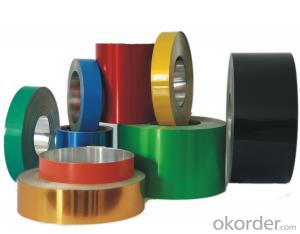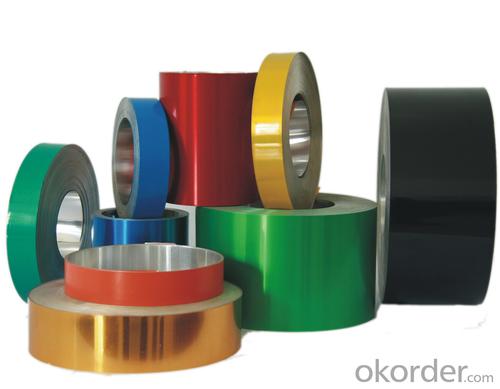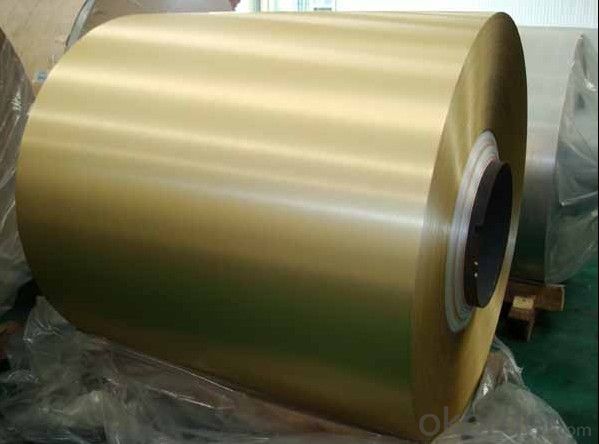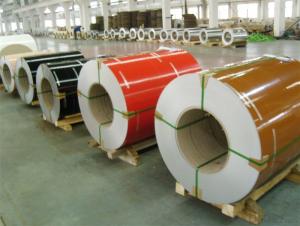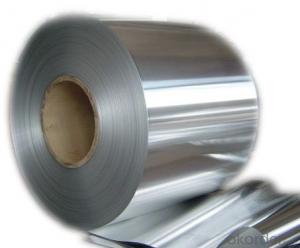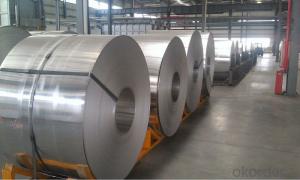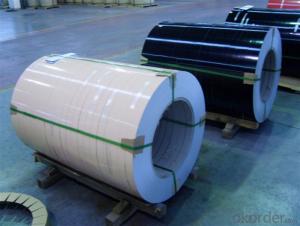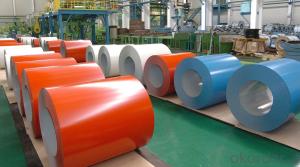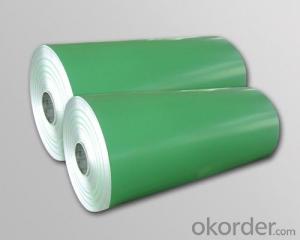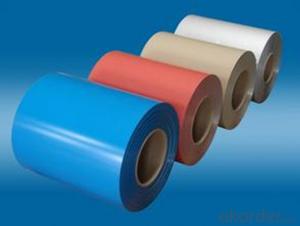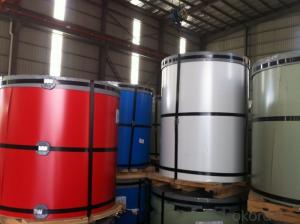Aluminum Coil Anodizing Corporation Aca Ral 8001 PE 18 Micros Coated Aluminium Coil
- Loading Port:
- Shanghai
- Payment Terms:
- TT OR LC
- Min Order Qty:
- 2 m.t.
- Supply Capability:
- 50000 m.t./month
OKorder Service Pledge
OKorder Financial Service
You Might Also Like
Specification
Description
Product | RAL 8001 PE 18 Micros Coated Aluminium Coil | ||
Alloy | 1100, 1145, 1050, 1060, 1070, 3003, 3013, 3005,etc. | Temper | H12.H14.H16.H18.H22. H24.H26.O etc. |
Thickness | 0.2-7.0mm | Width | Until 2550 |
Painting items | PE and PVDF | Color | All Standards of RAL |
Coil weight | At clients’ requestments | MOQ | 5 tons |
Payment terms | 30% down payment 70% against B/L copy, L/C at sight | ||
Delivery time | 20-30 days after getting your down payment | ||
Package | Wooden Pallet (Customized packing ways are welcomed) | ||
Remarks | The special dimensions can be produced according to clients’ specification | ||
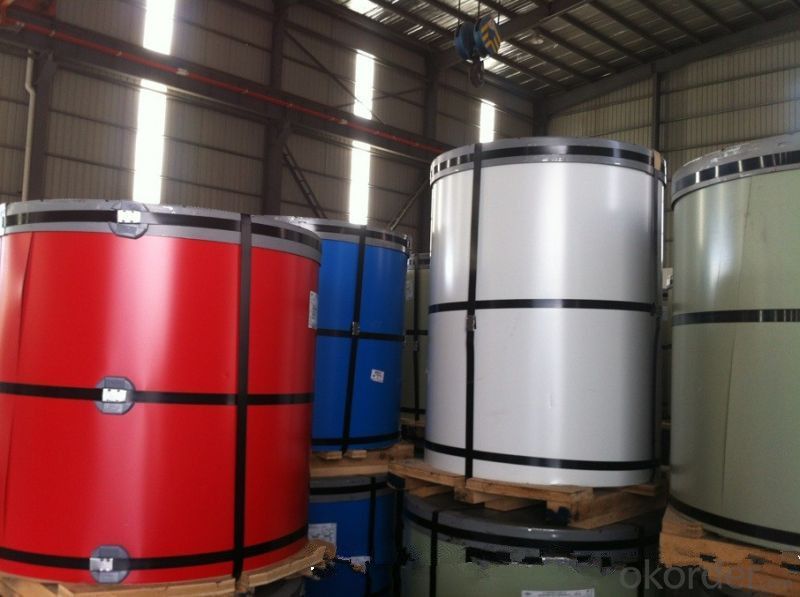
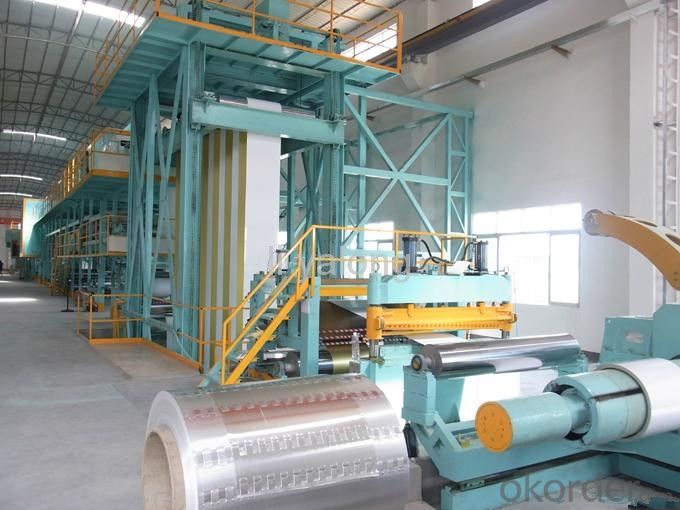
PE and PVDF Painting
Polyester Coatings (PE)
PE (polyester) coatings exhibit an excellent combination of hardness, flexibility, flow, appearance, and superior resistance to dirt retention in indoor and outdoor applications. These coatings are highly resistant to abrasion, metal marking, staining, and marring, and require minimal maintenance. Glazetech uses polyester paints which provide excellent colour and gloss retention properties.
Polyvinylidene Fluoride Coatings (PVDF)
PVDF (polyvinylidene fluoride) is a chemical resistant thick film barrier coating commonly used in architectural applications where both excellent appearance and substrate protection must be maintained over a long period of time. This coating is unaffected by most chemicals and solvents and has excellent wear and abrasion resistance. PVDF also has a high dielectric strength, excellent resistance to weathering and the ability to self extinguish.
Application
Widely used in manufacturing of products as well as other industrial applications like:
Products Materials: PP cap stock, the traffic sign, air-conditioner heat and exchangers, food container, household foil, pharmaceutical packing, cigarettes packing etc.
Building Materials: aluminum curtain wall base plate, ACP, aluminum, ceilings, aluminum sheets, honeycomb panels and aluminum roofing, lighting decoration, household electrical appliances, food package (such as pop can cover & ring-pull), furniture ect.
FAQ
--Q: Do you provide free samples?
--A: Yes, free samples will be sent to you on freight at destination.
--Q: What is the MOQ?
--A: 2 tons
--Q: What kinds of alloy can you supply?
--A: 1000 series: 1050, 1060, 1070, 1100, 1145, 1200
3000 series: 3003, 3004, 3105, 3104
5000 series: 5052, 5083, 5754, 5182
6000 series: 6061, 6063, 6062, 6063
8000 series: 8011, 8021
--Q: What kinds of temper can you supply?
--A: O-H112: O,H12,H14,H16,H18,H22,H24,H26,H,32,H34,H111,H112
T3, T4, T6
- Q: Can aluminum coils be used for architectural applications?
- Yes, aluminum coils can be used for architectural applications. Aluminum is a versatile and lightweight material that is commonly used in construction due to its durability, corrosion resistance, and ease of installation. It can be formed into coils and used for various architectural elements such as roofing, cladding, facades, gutters, and window frames.
- Q: Are aluminum coils compatible with different welding methods?
- Yes, aluminum coils are compatible with different welding methods. Aluminum is a versatile metal that can be welded using various techniques such as gas tungsten arc welding (GTAW), also known as TIG welding, and gas metal arc welding (GMAW), also known as MIG welding. These methods are commonly used for welding aluminum coils due to their ability to produce high-quality welds with good strength and appearance. TIG welding is particularly suitable for aluminum as it allows for precise control of heat input and provides excellent weld quality. It uses a non-consumable tungsten electrode and an inert gas such as argon to shield the weld zone from atmospheric contamination. MIG welding, on the other hand, is a faster process that uses a consumable wire electrode and a shielding gas to protect the weld pool. It is widely used in industrial applications due to its efficiency and ease of use. In addition to TIG and MIG welding, other methods such as laser welding and friction stir welding can also be used for aluminum coils, depending on the specific requirements of the application. It is important to note that proper preparation, including cleaning and surface treatment of the aluminum coils, is crucial for achieving successful welds. This ensures the removal of any contaminants or oxide layers that may negatively affect the welding process. Overall, aluminum coils are compatible with different welding methods, and the choice of technique depends on factors such as the desired weld quality, production requirements, and the skills and equipment available.
- Q: What precautions should be taken to ensure the safe and efficient transportation of aluminum coils?
- <p>The best way to handle aluminum coil during transportation involves using proper lifting equipment, ensuring secure strapping, and maintaining a stable and dry environment. Use slings or lifting beams specifically designed for metal coils to prevent damage. Ensure the coil is strapped tightly to prevent shifting during transit. Keep the coils covered to protect from moisture and dirt. Always follow the manufacturer's guidelines for weight limits and handling procedures.</p>
- Q: Can aluminum coils be used in automotive heat exchangers?
- Indeed, automotive heat exchangers can utilize aluminum coils. The automotive industry favors aluminum for heat exchangers due to its exceptional thermal conductivity, lightweight quality, and resistance against corrosion. These attributes enable aluminum coils to effectively transfer heat between fluids or gases, rendering them highly suitable for automotive heat exchangers. Furthermore, aluminum coils are easily manufacturable and can be molded into diverse shapes and sizes, thereby further enhancing their appropriateness for automotive applications.
- Q: How are aluminum coils protected against galvanic corrosion?
- To protect aluminum coils from galvanic corrosion, a combination of surface treatments and protective coatings is employed. An effective method involves applying anodization, which entails treating the aluminum with an acid solution through electrolysis. This process forms a protective oxide layer on the surface, acting as a barrier against direct contact with other metals that could cause galvanic corrosion. Alternatively, a protective coating such as a polymer or paint can be used on the aluminum coils. These coatings create a physical barrier, shielding the metal from corrosive elements in the environment. Careful consideration is given to selecting coatings that adhere well to the aluminum surface and exhibit excellent resistance to corrosion. Aside from surface treatments and coatings, proper design and material selection are crucial in safeguarding aluminum coils against galvanic corrosion. Avoiding direct contact between dissimilar metals and opting for compatible materials helps minimize the risk of corrosion. Isolation materials, such as gaskets or insulating tapes, can be utilized to separate the aluminum coil from other metals in contact. Regular maintenance and cleaning also contribute to protection against galvanic corrosion. It is essential to regularly remove accumulated dirt, debris, and corrosive substances from the aluminum coils to prevent the formation of localized corrosion cells. In conclusion, a combination of surface treatments, protective coatings, proper design, and regular maintenance is vital in preserving the longevity and performance of aluminum coils in various applications.
- Q: What are the uses of aluminum coils?
- Aluminum coils have a wide range of uses across various industries. One of the primary uses of aluminum coils is in the manufacturing of HVAC systems and air conditioning units. The coils are used to transfer heat and cool air, making them essential components in these systems. Additionally, aluminum coils are also commonly used in the construction industry for roofing, cladding, and insulation purposes. They are lightweight, durable, and resistant to corrosion, making them ideal for outdoor applications. The automotive industry also utilizes aluminum coils in the production of vehicles. They are used in the manufacturing of various parts, including radiators, heat exchangers, and condensers, due to their excellent heat transfer properties. Aluminum coils are also extensively used in the packaging industry. They are used to produce cans and containers for food and beverages. Aluminum is a great choice for packaging as it is lightweight, recyclable, and provides a barrier against moisture, oxygen, and light, ensuring the quality and freshness of the enclosed products. Furthermore, aluminum coils find applications in electrical wiring, where they are used as conductors due to their high electrical conductivity. They are also used in the production of electronics, such as laptops, smartphones, and tablets, as they offer excellent heat dissipation properties. Overall, the uses of aluminum coils are diverse and varied, ranging from HVAC systems and construction to automotive, packaging, and electrical applications. The versatility, durability, and excellent properties of aluminum make it a preferred material choice in many industries.
- Q: What are the common testing methods for aluminum coils?
- To ensure the quality and performance of aluminum coils, various testing methods are utilized. These methods encompass: 1. Visual inspection: A comprehensive examination of the coils is conducted to identify any visible defects like dents, scratches, or surface irregularities. This serves as an initial and fundamental step in the testing process. 2. Dimensional measurement: The dimensions of the aluminum coils are measured to verify if they meet the specified requirements. This involves assessing the length, width, and thickness of the coils. 3. Tensile testing: The mechanical properties of the aluminum coils, such as strength and elasticity, are evaluated through tensile testing. This procedure entails applying a tensile force to a sample of the coil until it fractures or deforms, enabling the determination of its tensile strength. 4. Hardness testing: The suitability of aluminum coils for specific applications is determined by assessing their hardness. Various methods, such as Rockwell or Brinell hardness tests, are employed to measure the coil's surface resistance to indentation or scratching. 5. Chemical composition analysis: The chemical composition of the aluminum coil is analyzed to ensure it meets the required specifications. Common techniques used for this analysis include spectroscopy or X-ray fluorescence (XRF) analysis. 6. Corrosion resistance testing: Due to exposure to harsh environmental conditions, it is crucial to assess the resistance of aluminum coils to corrosion. Tests such as salt spray testing or electrochemical impedance spectroscopy (EIS) are conducted to determine the coil's ability to withstand corrosion. 7. Coating quality assessment: If the aluminum coil is coated with a protective layer, testing methods such as adhesion testing, coating thickness measurement, or impact resistance testing are employed to ensure the quality and durability of the coating. These testing methods are commonly employed for aluminum coils. By conducting these tests, manufacturers can guarantee that the coils meet the required standards and perform optimally in their intended applications.
- Q: What are the typical production volumes for aluminum coil manufacturers?
- Aluminum coil manufacturers' production volumes can vary depending on factors like the size of the manufacturer, market demand, and production capacity. Generally, these manufacturers produce large quantities of coils to meet the needs of different industries. Some manufacturers produce a few hundred tons of aluminum coils per month, while others with larger production capacities can produce thousands of tons. The specific requirements of customers also influence production volumes, as manufacturers customize their production to meet customers' demands. Industries like construction, automotive, packaging, and aerospace have high demand for aluminum coils, leading to increased production volumes. Manufacturers can also produce various sizes and thicknesses of aluminum coils, further expanding their production volumes to cater to diverse market needs. It is important to consider that production volumes for aluminum coil manufacturers can fluctuate based on market conditions, economic factors, and industry trends. Manufacturers continually work towards optimizing their production processes and capacities to efficiently meet demand while maintaining high-quality standards.
- Q: Can aluminum coils be custom-made to specific requirements?
- Indeed, specific requirements can be met through the customization of aluminum coils. These coils possess great versatility and can be adjusted to fulfill a diverse array of specifications and applications. Manufacturers possess the capability to tailor the coil's dimensions, thickness, width, and length to accommodate particular needs. Moreover, the application of various surface finishes, including embossed patterns or coatings, can enhance both aesthetic appeal and functionality. The customization of aluminum coils enables the precise fulfillment of specific needs within industries such as construction, transportation, aerospace, and more.
- Q: Are there any limitations to the maximum coil length of aluminum coils?
- The maximum length of aluminum coils is subject to certain limitations. Factors that affect the maximum coil length include the thickness and width of the coil, the strength and tensile properties of the aluminum alloy, the equipment used for coil processing, and the intended application of the coil. One limitation is the strength and ductility of the aluminum alloy. Aluminum alloys with higher strength and lower ductility may have restrictions on the maximum coil length due to the risk of coil breakage or deformation during processing or handling. Another limitation is the coil processing equipment. The maximum coil length is often determined by the size and capabilities of the equipment used for slitting, cutting, or forming the coils. If the equipment has limited capacity or is not designed for longer coils, it may not be able to effectively handle or process longer lengths. The intended application of the coil can also impose limitations. For example, in the automotive industry, there may be restrictions on the maximum coil length based on the size and weight limitations of the vehicles. Moreover, logistical factors such as transportation and storage can also impose limitations. Longer coils may be more challenging to handle, transport, and store, which can increase the risk of damage or pose challenges in terms of logistics and space requirements. Therefore, it is crucial to consider various factors such as alloy properties, equipment capabilities, application requirements, and logistical considerations to determine the practical limitations of coil length for a specific situation, as there is no specific universal limit to the maximum coil length of aluminum coils.
Send your message to us
Aluminum Coil Anodizing Corporation Aca Ral 8001 PE 18 Micros Coated Aluminium Coil
- Loading Port:
- Shanghai
- Payment Terms:
- TT OR LC
- Min Order Qty:
- 2 m.t.
- Supply Capability:
- 50000 m.t./month
OKorder Service Pledge
OKorder Financial Service
Similar products
Hot products
Hot Searches
Related keywords
